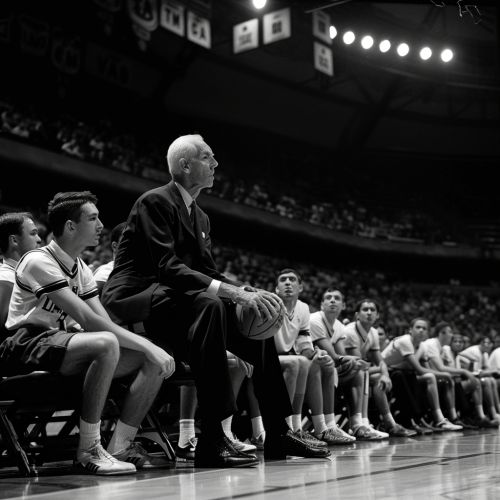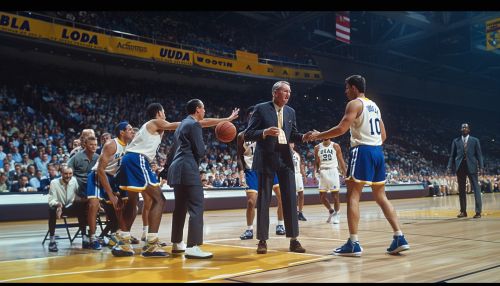John Wooden
Early Life and Education
John Robert Wooden was born on October 14, 1910, in Hall, Indiana. He was the second of four sons to Joshua and Roxie Wooden. Wooden's early life was characterized by a strong family bond and a deep sense of community. His father, Joshua, instilled in him the values of hard work, integrity, and the importance of education. These principles would later become the foundation of Wooden's coaching philosophy.
Wooden attended Martinsville High School, where he excelled in basketball. Under the guidance of coach Glenn Curtis, Wooden led the Martinsville Artesians to three consecutive state finals, winning the championship in 1927. His high school success earned him a scholarship to Purdue University, where he played under coach Ward "Piggy" Lambert. At Purdue, Wooden was a three-time All-American and led the Boilermakers to a national championship in 1932.
Coaching Career
Early Coaching Years
After graduating from Purdue in 1932 with a degree in English, Wooden began his coaching career at Dayton High School in Kentucky. He then moved to South Bend Central High School in Indiana, where he coached for nine years. During this period, Wooden also served as an English teacher, emphasizing the importance of academics to his players.
In 1946, Wooden accepted a position as the head coach at Indiana State Teachers College (now Indiana State University). During his two-year tenure, Wooden led the team to a 44-15 record and an appearance in the NAIB (National Association of Intercollegiate Basketball) National Tournament. Notably, Wooden advocated for the inclusion of an African American player, Clarence Walker, in the tournament, highlighting his commitment to equality and social justice.
UCLA Bruins
In 1948, Wooden was hired as the head coach of the University of California, Los Angeles (UCLA) men's basketball team. Over the next 27 years, Wooden transformed UCLA into a basketball powerhouse. His tenure at UCLA is often considered one of the most successful coaching careers in the history of sports.
Wooden's coaching philosophy was built on his "Pyramid of Success," a conceptual framework that emphasized personal and team development. The pyramid included attributes such as industriousness, enthusiasm, and competitive greatness, which Wooden believed were essential for achieving success both on and off the court.
Under Wooden's leadership, UCLA won 10 NCAA national championships in a 12-year period, including seven consecutive titles from 1967 to 1973. Wooden's teams also achieved an 88-game winning streak, a record that still stands today. His coaching style was characterized by meticulous preparation, disciplined play, and an emphasis on fundamentals.


Coaching Philosophy
Wooden's coaching philosophy extended beyond the basketball court. He believed in developing the character of his players and preparing them for life after basketball. Wooden's "Pyramid of Success" was a key component of his philosophy. The pyramid consisted of 15 building blocks, each representing a specific trait or quality that Wooden believed was essential for achieving success.
The base of the pyramid included traits such as industriousness, friendship, loyalty, cooperation, and enthusiasm. The middle tiers included self-control, alertness, initiative, intentness, condition, skill, and team spirit. The top of the pyramid was composed of poise, confidence, and competitive greatness. Wooden often emphasized that success was not defined by winning games but by the effort and dedication put forth by the individual and the team.
Wooden also stressed the importance of preparation and attention to detail. He believed that success was the result of hard work and meticulous planning. Wooden's practices were known for their precision and structure, with each drill and exercise designed to improve specific aspects of the game.
Legacy and Impact
John Wooden's impact on the game of basketball and the lives of his players is immeasurable. He is widely regarded as one of the greatest coaches in the history of sports. Wooden's success at UCLA set a standard for excellence that has yet to be surpassed. His coaching philosophy and "Pyramid of Success" continue to influence coaches and players across various sports.
Wooden's legacy extends beyond his coaching achievements. He was a mentor and role model to countless individuals, both within and outside the world of basketball. Wooden's emphasis on character development, integrity, and the pursuit of excellence has left a lasting impression on those who had the privilege of knowing him.
In recognition of his contributions to the sport, Wooden was inducted into the Naismith Memorial Basketball Hall of Fame twice, once as a player in 1960 and again as a coach in 1973. He received numerous awards and honors throughout his lifetime, including the Presidential Medal of Freedom in 2003.
Personal Life
John Wooden married his high school sweetheart, Nell Riley, in 1932. The couple had two children, Nancy and James. Wooden often credited Nell with being his greatest source of support and inspiration. The couple remained married for 53 years until Nell's passing in 1985.
Wooden was known for his humility and modesty. Despite his numerous accomplishments, he remained grounded and focused on the values that had guided him throughout his life. Wooden was an avid reader and often quoted poetry and literature to inspire his players and colleagues.
Death and Posthumous Recognition
John Wooden passed away on June 4, 2010, at the age of 99. His death was met with an outpouring of tributes from the basketball community and beyond. Wooden's influence on the game and the lives of those he touched continues to be celebrated and remembered.
In the years following his death, numerous books, documentaries, and articles have been published about Wooden's life and legacy. The John R. Wooden Award, established in 1976, continues to be awarded annually to the most outstanding men's and women's college basketball players.
